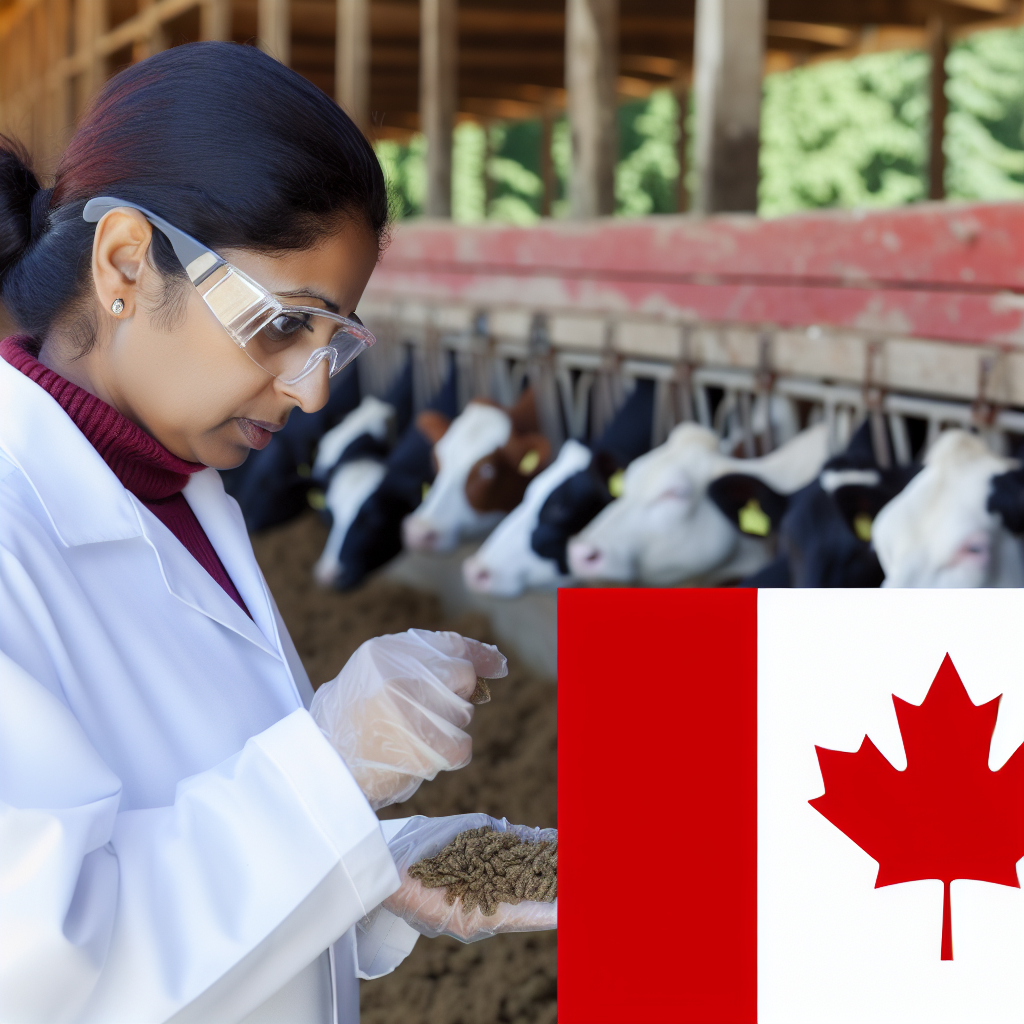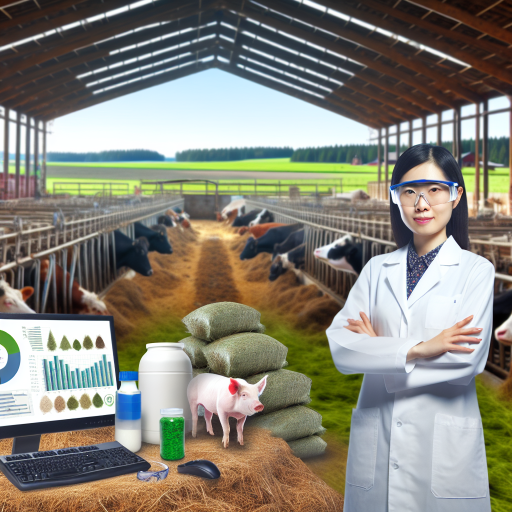Overview of Livestock Nutrition
Definition
Livestock nutrition refers to the feeding and dietary needs of farm animals.
Essentially, it encompasses the provision of nutrients necessary for health.
These nutrients include protein, vitamins, minerals, and energy sources.
Proper nutrition is foundational for animal growth and reproduction.
In Canada, livestock nutrition is critical for economic viability.
Importance
Good nutrition significantly impacts animal performance.
Healthy livestock yields better quality products.
This includes more milk, meat, and wool production.
Additionally, well-nourished animals exhibit improved fertility rates.
Furthermore, proper nutrition enhances immune function.
This reduces susceptibility to diseases and infections.
Role in Sustainability
Birds, cattle, and other livestock play vital roles in sustainable agriculture.
Proper nutrition helps minimize environmental impacts.
This includes reducing methane emissions from cattle.
Furthermore, well-fed animals require fewer resources over time.
Efficient livestock management aligns with eco-friendly practices.
Economic Impact
Nutrition significantly influences the profitability of livestock operations.
Well-fed animals reduce feed costs and increase returns.
Moreover, optimized nutrition leads to higher market value for products.
This contributes to overall economic sustainability in Canadian agriculture.
Investing in livestock nutrition pays dividends in diverse ways.
Nutritional Requirements of Major Livestock Species in Canada
Cattle Nutrition
Cattle require a balanced diet to maintain health and productivity.
They primarily need energy, protein, vitamins, and minerals.
Energy comes from carbohydrates found in forages and grains.
Protein is essential for growth and milk production.
Unlock Your Career Potential
Visualize a clear path to success with our tailored Career Consulting service. Personalized insights in just 1-3 days.
Get StartedMinerals like calcium and phosphorus support bone health.
Vitamin supplementation can improve immune function.
Farmers should assess forage quality regularly.
This assessment helps in making necessary dietary adjustments.
Poultry Nutrition
Poultry nutrition focuses on providing a complete feed mix.
Chickens require a balance of energy, protein, and amino acids.
Common corn and soybean meal are primary ingredients.
Vitamin and mineral supplementation is crucial for health.
Calcium is vital for egg-laying hens.
Farmers must monitor feed intake for optimal growth rates.
Quality feed promotes stronger immune systems among the flock.
Swine Nutrition
Swine have specific nutritional needs throughout their growth stages.
Their diet includes energy sources like grains and protein supplements.
Amino acids are important, especially lysine, for growth.
Minerals such as zinc and selenium support overall health.
Providing enough fresh water is also essential for swine.
Regularly analyzing feed ingredients is necessary to maintain quality.
Farmers should consult with nutritionists for optimal diets.
Sheep and Goat Nutrition
Sheep and goats have unique dietary requirements compared to other livestock.
They thrive on high fiber diets from high-quality forages.
Protein needs vary based on their production stage.
Minerals play a critical role in reproductive health.
Pasture management is vital for providing adequate nutrients.
Regular health assessments help ensure dietary needs are met.
Equine Nutrition
Equines require a carefully balanced diet for optimal performance.
Their diet primarily consists of forage, grains, and supplements.
Quality hay and pasture provide essential fiber.
Grains can be fed, but moderation is key to prevent digestive issues.
Electrolytes and vitamins support hydration and recovery.
Feeding schedules should align with their activity levels.
Consulting a veterinarian enhances proper dietary management.
Impact of Livestock Nutrition on Animal Health and Productivity
Enhancing Animal Health
Proper nutrition plays a critical role in maintaining livestock health.
A balanced diet boosts the immune system of animals.
Healthier animals resist diseases and recover faster from illnesses.
Additionally, essential nutrients aid in the development of stronger bones and muscles.
For example, calcium and phosphorus are vital for skeletal health.
Moreover, an adequate intake of vitamins prevents deficiencies that can lead to health issues.
Boosting Productivity
Nutrition directly influences livestock productivity levels.
Well-fed animals produce higher quantities of milk and meat.
This increase translates into better profitability for farmers.
Furthermore, optimal nutrition enhances reproductive performance among animals.
Healthy animals exhibit improved fertility rates and better offspring outcomes.
Cost-Effectiveness of Quality Nutrition
Investing in livestock nutrition yields long-term financial benefits.
Excellent feed quality reduces the incidence of health-related costs.
When animals receive proper nutrition, they experience fewer health problems.
This efficiency leads to reduced veterinary expenses and medication costs.
Consequently, farmers can enjoy higher margins on their products.
Long-Term Effects on Sustainability
Proper nutrition supports sustainable farming practices.
Healthy animals require less food to produce the same amount of output.
This efficiency contributes to lower waste production from feed.
Furthermore, well-nourished livestock can have a smaller environmental footprint.
By enhancing productivity and efficiency, sustainable practices become more achievable.
See Related Content: Education and Certifications for Seed Technologists
Role of Feed Quality and Composition in Livestock Nutrition
Impact on Animal Health
Quality feed significantly affects the overall health of livestock.
Healthy animals lead to improved production rates.
Moreover, better nutrition enhances immune function.
This reduces the likelihood of disease outbreaks.
Effects on Growth and Development
Proper feed composition promotes optimal growth in young animals.
Nutrients like protein and minerals play crucial roles.
For instance, calcium is vital for bone development.
Similarly, protein supports muscle growth and repair.
Role in Reproductive Performance
Feed quality directly influences reproductive success.
Well-balanced diets enhance fertility and offspring viability.
For example, diets rich in omega-3 fatty acids improve reproductive outcomes.
Economic Implications
Quality feed can lead to better feed conversion ratios.
This results in lower overall feeding costs.
Consequently, it increases the profitability of livestock operations.
Higher-quality livestock also commands better market prices.
Feed Sources and Composition
A diverse array of feed sources contributes to balanced nutrition.
Cereal grains, legumes, and forage all play important roles.
Each feed source offers distinct nutrient profiles.
Producers should analyze these profiles to optimize diets.
Seasonal Variations and Nutritional Strategies
Feed availability varies with the seasons in Canada.
Producers must adapt nutritional strategies accordingly.
For example, during winter, hay quality becomes crucial.
Supplementation may also be necessary to meet nutrient needs.
Delve into the Subject: Impact of Climate Change on Seed Technology Practices
Economic Implications of Livestock Nutrition on Canadian Agriculture
Enhancing Productivity
Livestock nutrition directly affects the productivity of animals.
Healthy animals produce more milk, meat, and wool.
For example, well-fed cattle yield higher amounts of beef.
This increase in productivity contributes positively to farmers’ profits.
Additionally, optimized nutrition leads to improved feed conversion rates.
Farmers can produce more with less input, maximizing efficiency.
Costs of Poor Nutrition
Poor nutrition can result in significant economic losses.
Farmers may face higher veterinary costs due to sick animals.
Low productivity can also lead to decreased sales and revenue.
Moreover, feed that lacks essential nutrients can stunt growth.
This results in smaller livestock at market time, reducing profits.
Quality-Based Pricing
Nutrition influences the quality of animal products.
Better nutrition improves the quality of meat and dairy products.
Consumers are often willing to pay a premium for high-quality products.
This can lead to higher income for Canadian farmers.
Additionally, quality products often have stronger market demand.
Market Competitiveness
A focus on livestock nutrition enhances market competitiveness.
Farmers can respond better to market demands when livestock are healthy.
Efficient nutrition strategies lead to consistent product availability.
In turn, this can strengthen the farmers’ position in the market.
Furthermore, it attracts consumers looking for reliable food sources.
Environmental Considerations
Good nutrition practices can help reduce environmental impacts.
By optimizing feed use, farmers can minimize waste.
Reducing waste contributes to more sustainable farming practices.
This approach leads to a lower carbon footprint over time.
Consequently, sustainable practices can appeal to eco-conscious consumers.
Explore Further: Livestock Nutritionist Job Opportunities In Canada

Sustainable Practices in Livestock Nutrition: Reducing Environmental Footprint
Pursuing Sustainable Feeding Strategies
Sustainable feeding strategies play a crucial role in livestock nutrition.
These strategies reduce waste and enhance efficiency in animal production.
Farmers can use locally sourced ingredients to minimize transport emissions.
Utilizing alternative feed sources can also lower the carbon footprint.
Moreover, integrating forages into diets can improve nutrient utilization.
Optimizing Feed Efficiency
Improving feed efficiency directly affects the environmental impact of livestock.
Higher feed efficiency means animals require less feed to gain weight.
This reduction lowers the demand for land and water resources.
Thus, farmers can adopt ration balancing techniques to optimize nutrition.
Implementing Agroecological Principles
Agroecological principles support sustainable livestock nutrition practices.
These principles focus on the interactions between agricultural systems and ecosystems.
Research shows that diverse diets enhance animal health and productivity.
Farmers can plant diverse crops to provide varied nutrients for livestock.
Benefits of Sustainable Practices
Sustainable practices in livestock nutrition lead to numerous benefits.
- They improve animal welfare and reduce stress levels.
- Additionally, they enhance product quality for consumers.
- Such approaches contribute to better soil health and biodiversity.
- Furthermore, they align with evolving consumer expectations for sustainability.
Collaboration for Holistic Solutions
Collaboration is vital for effective sustainable livestock nutrition.
Farmers can work with nutritionists to tailor diets specific to their needs.
Furthermore, government policies can support sustainable agriculture initiatives.
Research institutions can provide valuable insights into innovative practices.
Ultimately, engaging stakeholders leads to holistic solutions for livestock nutrition.
You Might Also Like: Networking Opportunities for Seed Technologists in Canada
Technological Advancements in Livestock Nutrition Management
The Role of Data Analytics
Data analytics significantly improves livestock nutrition management.
Farmers can track animal health more accurately through data collection.
Additionally, this information helps tailor diets to specific livestock needs.
As a result, nutrient intake becomes more efficient and effective.
Data-driven insights enable better decision-making for feed formulations.
Precision Nutrition Techniques
Precision nutrition enhances the quality of feeds used in livestock farming.
Technologies like RFID tags monitor individual animals’ dietary needs.
These devices provide real-time feedback on feeding habits and consumption.
Farmers can then adjust diets immediately based on these insights.
This personalized approach boosts overall livestock health and productivity.
Innovations in Feed Production
Feed production has seen remarkable innovations recently.
Biotechnology allows the development of higher-quality feed ingredients.
These advancements focus on improving digestibility and nutrient absorption.
Furthermore, using alternative protein sources is gaining importance.
This strategy addresses sustainability challenges in feed supply chains.
Mobile Applications and Management Tools
Mobile applications streamline livestock nutrition management.
Farmers can track and manage feed inventories more efficiently.
These tools facilitate communication between nutritionists and farmers.
As a result, adjustments to feeding regimens can occur promptly.
Moreover, access to virtual resources enhances educational opportunities.
The Impact of Artificial Intelligence
Artificial intelligence automates various aspects of livestock nutrition.
AI can predict growth rates and optimize feed types based on real-time data.
This technology greatly reduces resources and time spent on decision-making.
In turn, it promotes healthier livestock and improved economic returns.
Ultimately, AI enables farmers to enhance their overall productivity.
Challenges and Solutions in Achieving Optimal Livestock Nutrition
Understanding Nutritional Deficiencies
Nutritional deficiencies can significantly impact livestock health and productivity.
Many farmers in Canada face challenges in providing balanced diets.
Understanding specific nutrient requirements is crucial for livestock well-being.
Common deficiencies include proteins, vitamins, and minerals.
Additionally, inadequate feed quality can contribute to these deficiencies.
Assessing Feed Quality
Feed quality directly influences livestock nutrition and growth performance.
Cereal grains often serve as the primary energy source in livestock diets.
However, the nutritional value can vary among feed ingredients.
Agricultural professionals recommend regular feed testing to ensure quality.
Farmers should work with nutritionists to formulate balanced rations.
Incorporating Technological Solutions
Technology can enhance livestock nutrition management.
Precision feeding systems allow farmers to provide tailored nutrient solutions.
Moreover, software programs offer data analysis for outdoor feeding practices.
Mobile apps also assist farmers in monitoring feed intake and health metrics.
Addressing Environmental Factors
Environmental factors significantly affect livestock nutrition in Canada.
Seasonal changes can alter the availability and quality of forage.
Farmers must adapt feeding strategies based on seasonal variations.
Additionally, weather patterns can impact feed storage and preservation.
Implementing proper storage techniques can mitigate nutrient loss.
Fostering Education and Resources
Education plays a vital role in improving livestock nutrition practices.
Farmers should seek resources from agricultural extension programs.
Workshops and seminars can provide valuable insights into nutrition management.
Collaboration with universities and research institutions can yield innovative findings.
Sharing knowledge among farmers can create a community focused on improvement.
Promoting Sustainable Practices
Sustainable practices contribute to achieving optimal livestock nutrition.
Incorporating rotational grazing can improve pasture quality and nutrient availability.
Cover crops enhance soil health and provide additional feed sources.
Furthermore, sustainable feeding strategies can reduce reliance on external inputs.
Farmers should embrace practices that support both productivity and environmental health.
Additional Resources
Backgrounding Feeder Cattle Nutrition | Cattle | Government of …




